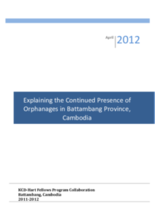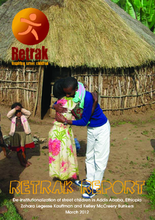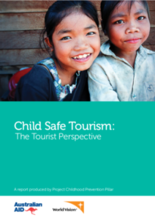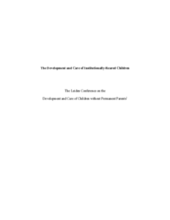Displaying 611 - 620 of 771
This qualitative research study seeks to better understand some of the reasons for residential care expansion in the province of Battambang, Cambodia. The study aims to identify why children are sent to orphanages and understand the attitudes of those stakeholders who are influencing the rise in institutions in the province.
In this article, the authors briefly review the history of institutional care and surrogate care. They then discuss why institutional care is at odds with children’s needs, and review the empirical evidence regarding the effects of institutional care on young children’s development.
The study was carried out in Addis Ababa, Ethiopia. The purpose of this research is to utilise information collated from literature review as well as informant interviews and focus group discussions to identify good practices or help inform the development of such practices aimed at assisting street children currently residing in institutional care to return to a family-based environment.
The Deinstitutionalization Toolkit is designed to provide all those interested in institutional closures and expanded community living opportunities for people with intellectual disabilities and developmental disabilities (ID/DD) with information, strategies, state data, and case studies that can facilitate closure and build community capacity to serve more people with ID/DD in the community. It covers topics such as building a broad-based coalition, understanding and working within the political environment, creating a community system of care, and relevant laws, policies, and court decisions.
This report summarises findings from a recent online survey conducted with over 300 international travellers to Cambodia, Lao PDR, Thailand and Vietnam.
This article sets out some of the evidence of the impact of institutionalisation on children in Europe.
This article provides an update on a series of projects that have highlighted the issue of institutionalization of children in Europe, arguing that babies and small children aged less than 3 years old, with or without disability, should not be placed in residential care without a parent or primary caregiver.
This article briefly summarizes the literature on elements of research, practice, and policy pertaining to the development and care of children raised in institutions. It covers such children’s development while they reside in institutions and after their transition to adoptive or foster families.
This paper from Monographs of the Society for Research in Child Development Volume 76, Issue 4 proposes a number of key components for translating research into policy and programs: analyzing the situation, using evidence to build the case for action, developing policies, building program capacity in child welfare and early childhood development, creating a family‐based child welfare system, and developing a system of monitoring and accountability.
Children within institutional care settings experience significant global growth suppression, which is more profound in children with a higher baseline risk of growth impairment (e.g., low birth weight [LBW] infants and children exposed to alcohol in utero), according to this chapter from Monographs of the Society for Research in Child Development Volume 76, Issue 4.




